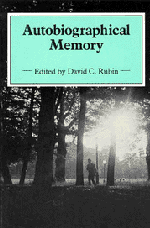Book contents
- Frontmatter
- Contents
- List of contributors
- Preface
- Part I Overview
- Part II Historical, theoretical, and methodological contexts for the study of autobiographical memory
- Part III The general organization of autobiographical memory
- Part IV The temporal organization of autobiographical memory
- Part V Temporal distributions of autobiographical memories
- Part VI Failures of autobiographical memory
- 13 Amnesia, autobiographical memory, and confabulation
- 14 A case study of the forgetting of autobiographical knowledge: implications for the study of retrograde amnesia
- 15 Loss and recovery of autobiographical memory after head injury
- Author index
- Subject index
15 - Loss and recovery of autobiographical memory after head injury
Published online by Cambridge University Press: 01 March 2011
- Frontmatter
- Contents
- List of contributors
- Preface
- Part I Overview
- Part II Historical, theoretical, and methodological contexts for the study of autobiographical memory
- Part III The general organization of autobiographical memory
- Part IV The temporal organization of autobiographical memory
- Part V Temporal distributions of autobiographical memories
- Part VI Failures of autobiographical memory
- 13 Amnesia, autobiographical memory, and confabulation
- 14 A case study of the forgetting of autobiographical knowledge: implications for the study of retrograde amnesia
- 15 Loss and recovery of autobiographical memory after head injury
- Author index
- Subject index
Summary
What follows is a transcript of two sessions with Mr. A., edited to protect his anonymity and to delete extraneous ramblings. These sessions are the data. Background literature and theoretical speculations may be found in the footnotes.
Mr. A. said he had had a head injury from a bad traffic accident, followed by a very long period of posttraumatic amnesia. His continuous memory had not returned for almost a year, and that had been almost 3 years ago. What he really wanted was to remember events of personal importance to him that had happened before the accident, but whether weeks or months before he did not know. The method of seeking autobiographical memories in association with cue words led him on a fishing expedition in oblivion.
Mr. A.: I want to know if everything I've been told is true. Some of the stuff interests me.
E. (Examiner): Now, you said there was a particular episode in the retrograde amnesia period you wanted to remember. Do you want to talk about that at all?
Mr. A.: It's just that my brother and I were trying to build something, and there was supposed to be a day when we had figured out how to get it to work. I'm curious about how we had solved the problem, what that day was like. It's blank in my memory.
- Type
- Chapter
- Information
- Autobiographical Memory , pp. 273 - 290Publisher: Cambridge University PressPrint publication year: 1986
- 14
- Cited by



